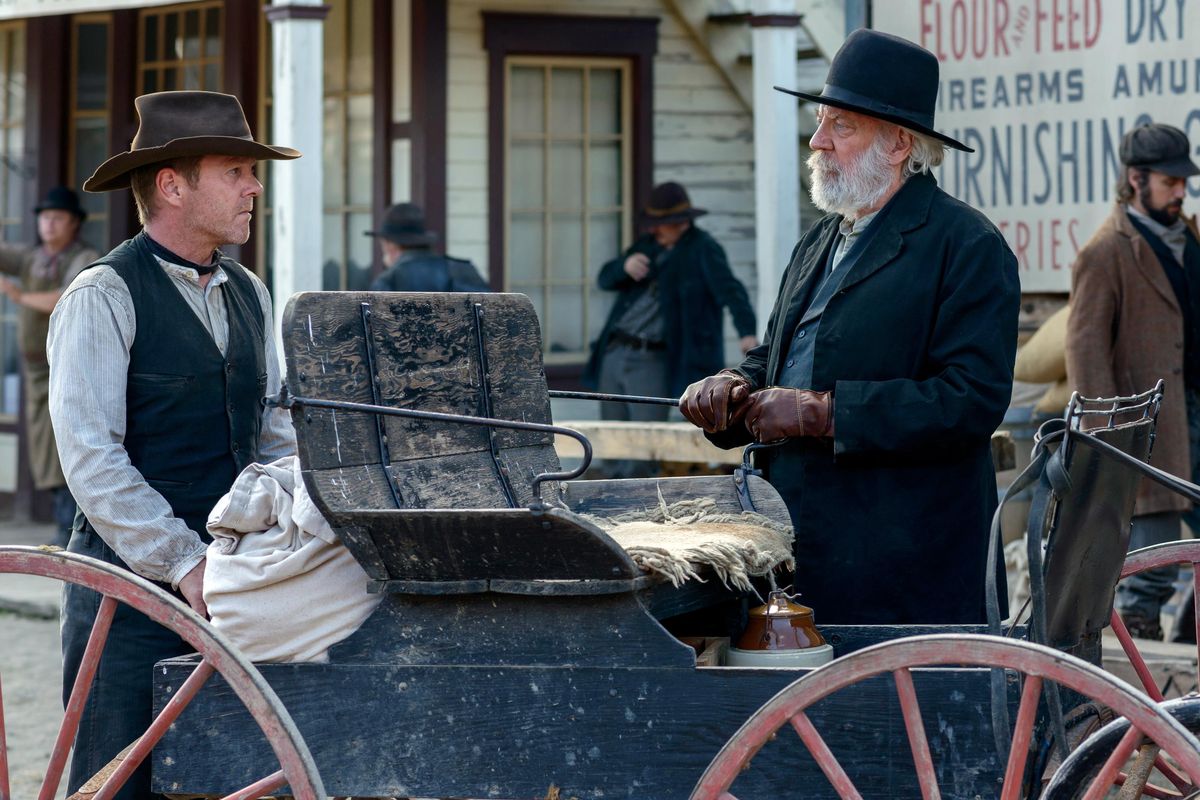Q&A: The Sutherlands bring relationship to the big screen

LOS ANGELES – Donald Sutherland, 80, and Kiefer Sutherland, 49, have nearly 275 combined credits and 85 years of experience between them, and have somehow only shared the screen three times.
The first was 1983’s “Max Dugan Returns.” The second was in 1996’S “A Time to Kill.” Now, finally, in the period Western “Forsaken,” now in theaters and on demand, the Sutherlands are not only sharing scenes, but a bloodline, playing father and son for the first time.
The Associated Press sat down with the storied actors to talk about the experience.
AP: Did you have an unspoken agreement that you wouldn’t necessarily try to work with one another often?
Kiefer: I’ve wanted to work with my dad since I started. There were three actors who I admired through school – my dad, Gene Hackman and Bobby Duvall.
AP: So why now?
Kiefer: When it wasn’t working out organically, I started thinking of different ideas. It wasn’t a fluke that we found something and we did it. It’s something that I’ve wanted to do for 30 years and just thought we better get it done sooner than later.
Donald: I had always said to him that I wanted to play Walter Huston to his John Huston, do “The Treasure of the Sierra Madre,” or an equivalent of that. But that never worked out. That’s what I really wanted. And then this came and I was very happy.
AP: Did you spend much time dissecting the story and your characters?
Kiefer: No.
Donald: Let me elaborate on that … no.
Kiefer: This has been true my whole life – when we spend time together, which is not as often as I, or I believe my dad, would like, we don’t talk about work.
AP: Did you learn anything about each other during this process?
Kiefer: There’s a way he goes to work and it’s built for speed and it’s incredibly effective and I think it’s incredibly well thought out. I would have to say this film more than any other single experience I’ve had as an actor, I was caught off guard by how looking into my father’s eyes would effect a scene.
Donald: Wait, what did you say?
Kiefer: That when I would be in the middle of a scene and when I would actually look into your eyes, I would look into your eyes from my life. They have a resonance to me and they mean something to me and so I would have a visceral reaction to that.
Donald: Because it goes years back.
Kiefer: I had to make a conscious choice not to get in the way of that. So things came to me in the process of making this film that would have been things that I would have had to work quite hard to arrive at. I felt like I was cheating.
Donald: It’s absolutely true. You’re doing … it’s stupid to say therapy, but your DNA informs a lot of your work. And the combination, you know it’s the same DNA roughly.
Kiefer: I lost the tall stick. That wasn’t one of the 21 pieces I got.
AP: So in that way, does this film mean more to you?
Kiefer: There are not a lot of films that I’ve been in that I can get through watching. It’s just an uncomfortable circumstance for me.
Donald: I never looked at them. He went to see “Six Degrees of Separation” and came out to me and said ‘you really should go see this.’ And I went to go see it. It’s the first film I’d seen all the way through. I didn’t see “Klute” all the way through. I certainly didn’t see “M*A*S*H.” “Ordinary People,” Bob (Redford) insisted I see it and I’m in the seat in the theater and I crawled out on my hands and knees.
Kiefer: I managed to make 208 episodes of “24” and I never watched a single one of them.
Donald: Really? They’re very good.
Kiefer: Thanks.
Donald: I would watch them and phone him the next morning.
Kiefer: In fact when he didn’t call I would get really concerned that this episode was not good. But this film was different for me. And it’s something I’ll hold on to for the rest of my life. The dynamic between this father and his son is not the dynamic between me and my father, but there are moments in it, like when they’re saying goodbye. I’ve had that moment with my father for real. And to have it in that way, to have it on a disc, that’s one thing that I’ll have with me forever.
I didn’t spend as much time with my dad as I wanted to when I was growing up and he didn’t spend as much time with me as he wanted to when I was growing up. I was thinking, ‘Well I didn’t get to go on that fishing trip with my dad and I didn’t get to do this with my dad.’ I wrapped two days after my dad and he was driving away, and I couldn’t help but smile and realize wow, we just spent eight weeks together, 14 hours a day, six days a week. And we made something. That’s a lot better than a (expletive) fishing trip.
Donald: We went fishing!
Kiefer: Well I know we went fishing.
Donald: I don’t like fishing.
Kiefer: I was using it more as a metaphor than anything else.
AP: Are you wistful that it took so long to do?
Donald: You do what I can. It’s not like we could have done it sooner. If we could have done it sooner we would have. I’m very, very glad we didn’t do it later. It’s quite possible I would not be here.